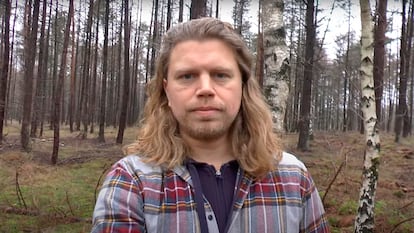Dutch justice puts the brakes on sperm donor who has fathered 550 children
The judges have imposed precautionary measures ordering Jonathan M. to cease his activity, following the allegation of a mother to whom he assured that he would not be the father of 25 children


Jonathan M., 41, the Dutch sperm donor to whom up to 550 children are attributed in and outside the Netherlands must stop his activity immediately. If he persists, he is liable to a fine of 100,000 euros (110.000 dollars) for each new donation. This has been ordered by a court in The Hague, which has issued precautionary measures this Friday in virtue of the lawsuit filed by one of the mothers who had offspring with the help of M. He deceived her by saying that he did not plan to have more than 25 children, the limit set by the current regulations. The ruling also prohibits the defendant from advertising on the Internet and from collaborating with prospective parents in search of a child. If he does so, he will be sanctioned. In addition, he must inform the court if he has made donations through other centers abroad. This is the first time the courts have dealt with such a case.
The judges have also ordered the destruction of the semen samples currently stored in fertility clinics, with the exception of those reserved for families who already have a child of his and wish to give him or her a sibling. The case of Jonathan M. has come before the Dutch courts after both a mother - who calls herself Eva - and the Donorkind Foundation sued him for endangering the mental and physical health of the children born from his sperm. “I asked the donor to respect our interests because the children need reassurance and I feel supported by the court. I hope this ruling will put an end to mass sperm donations and spread to other countries.” Esther de Lau, a member of the board of Donorkind, which connects people born by this method, now hopes that the Ministry of Health will set up a central registry of sperm donors “for everyone, whether they do it through clinics or privately.”
The foundation has underlined the risk of incest or inbreeding derived from massive and uncontrolled sperm donation. Hence, their claim emphasized the interest of the minor. Jonathan M. has gone to at least 13 Dutch clinics and has offered his services internationally through the Internet and various digital platforms. The donor himself estimates that he can have at least 550 children, and claims that his approach is novel. “I don’t believe in evolution, but in creation,” he declared in April, during the speedy trial that brought him to justice. When the judges asked him if he had evaluated the pain he could cause to so many children, and the impossibility for them to establish fraternal bonds, he answered: “That depends on the parents. We are dealing with a new concept, and it is up to us, the adults, to shape it.” Both the mother and Donorkind called his action a “bizarre social experiment that must end immediately.” In his defense, M. lamented being portrayed as “a rabid bull,” and argued that people have control over their bodies. Thus, imposing a veto on him would amount to “an attempt at chemical castration,” in the words of his lawyer, Richard van der Zwan.
According to the current Dutch rules, a donor can have a maximum of 25 children, or support 12 families
The situation was known since 2017, because the Dutch Association of Gynecologists and Obstetricians warned that M. already had 102 children with the mediation, then, of 11 clinics. According to current Dutch rules, the same donor can have a maximum of 25 children, or help 12 families. As those who choose this route usually have one or two children, the final number of offspring is more or less the same. The defendant had assured that he was no longer active since 2019, but the court has nevertheless issued the battery of prohibitions “in view of the lies previously and frequently told”. “Jonathan M. deliberately deceived the prospective parents about the number of children he had and induced them to accept him as a donor,” the sentence states. “All of these parents now find that they are part of a huge kinship network that they did not choose, and this has negative psychosocial consequences,” they conclude.
Anonymous sperm donations have been banned since 2004 in the Netherlands. There is a national registry with medical information about the donor that may be relevant for their children, in addition to their first and last name, date of birth and place of residence. However, fertility clinics do not share this data with each other, which is why Jonathan M. has remained active for so long. From the age of 16, children can consult this list, which has been kept for 80 years. The International Convention on the Rights of the Child, adopted by the UN General Assembly in 1989 and in force since 1990, states that everyone has the right, as far as possible, to know his or her biological parents.
Sign up for our weekly newsletter to get more English-language news coverage from EL PAÍS USA Edition
Tu suscripción se está usando en otro dispositivo
¿Quieres añadir otro usuario a tu suscripción?
Si continúas leyendo en este dispositivo, no se podrá leer en el otro.
FlechaTu suscripción se está usando en otro dispositivo y solo puedes acceder a EL PAÍS desde un dispositivo a la vez.
Si quieres compartir tu cuenta, cambia tu suscripción a la modalidad Premium, así podrás añadir otro usuario. Cada uno accederá con su propia cuenta de email, lo que os permitirá personalizar vuestra experiencia en EL PAÍS.
¿Tienes una suscripción de empresa? Accede aquí para contratar más cuentas.
En el caso de no saber quién está usando tu cuenta, te recomendamos cambiar tu contraseña aquí.
Si decides continuar compartiendo tu cuenta, este mensaje se mostrará en tu dispositivo y en el de la otra persona que está usando tu cuenta de forma indefinida, afectando a tu experiencia de lectura. Puedes consultar aquí los términos y condiciones de la suscripción digital.








































